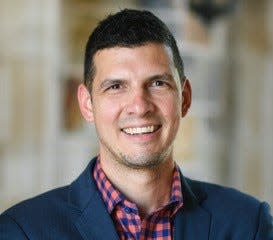What it means to be a real leader

There is a real disconnect between what we say we expect from our leaders and what we tolerate from the leaders that we choose.
I have taught courses on leadership in a big state university and in small private ones, and despite the differences in size and focus, there is one constant: The word “leadership” carries with it a certain magic. People are attracted to the mere idea of leadership, or what some scholars refer to as the “romance of leadership.” Of course, the ideal picture of leadership changes depending on people’s upbringings, experiences and values. Research tells us that most Americans are attracted to flat organizational structures in which their leader rolls up her sleeves alongside everybody else. Most people prefer working for a leader with whom they could sit down and have a cup of coffee, with whom they share values, viewpoints and experiences.
In the highly respected GLOBE Project, Robert House and his colleagues studied more than 17,000 managers from 951 organizations across 62 countries. While they found remarkable differences in peoples’ work styles and values, the researchers recognized some conceptions of leaders that remained consistent across all cultures: Diplomacy. Integrity. Vision. Inspiration. These are the traits that people the world over have decided are most important for our leaders to possess.
When we turn on the news, we see a different picture. The media has taught us that any attention is good attention, and the lines between celebrity and leadership have become blurred. Money and fame are far stronger litmus tests for success than the standards that we claim to value. Case in point: In a recent undergraduate class, I asked my students to name leaders that they admired in all spheres of life. Successful people like Steve Jobs, LeBron James and Abraham Lincoln dominated the conversation. Yet when asked what people had most influenced their personal lives, students’ answers swerved from the celebrity to the intimate. Mom. Coach. Grandpa. Teacher. Real leadership happens in the trenches.
It’s past time that we challenge our own assumptions about leadership. While the word “leadership” has helped to sell millions of books in airport bookstores, it is far too often a tool of propaganda and manipulation. Leadership isn’t about saying edgy stuff that gets likes on social media. Effective leadership is about influence toward something that is mutual and shared. As I tell my students, we are all constantly influencing those around us, whether we want to be or not. Good leadership must be cultivated.
We need to EXPECT more from our leaders. Positions and titles carry power and authority. They too often do not necessitate or produce leadership. Until we demand that the people in leadership positions display positive behavior, we will continue to live in a world of ever-shifting standards.
We need to EDUCATE our children about leadership. The assumption that people will naturally gravitate toward ethical choices is, at best, an optimistic one. Leadership education needs to be systematic and consistent from elementary school through university.
Lastly, we need to ENGAGE in leadership and influence. Edmund Burke famously stated that “The only thing necessary for the triumph of evil is for good men to do nothing.” The formula for change, for real leadership reform, begins with us.
A leadership crisis demands strong leadership. That leadership does not require position nor power. Leadership can begin as a groundswell, germinating from the grassroots. “We the people” can be the real impetus for accountable leadership. That is what the founders had in mind. As we enter the next election cycle, let’s demand more from our leaders. Let’s stop voting for leaders who don’t reflect our values. Let’s remain mindful of our own influence. And, when the opportunity arises, let’s step up to lead.
Nate Pearson, Ph.D., is the Dean of Social Sciences and Humanities at Southeastern University. He studies leadership, meaning and workplace engagement. He lives with his wife and two children in Winter Haven.
This article originally appeared on The Ledger: What it means to be a real leader
